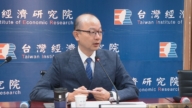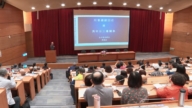【新唐人2011年6月20日讯】台湾军事将领郝柏村,最近出版了自己的新书,以他自己的亲身经历,回忆了上世纪中叶国共内战期间的历史,并评论了蒋介石个人。郝柏村认为,在对外斗争中,蒋介石过于阳刚,所以败给毛泽东的阴狠。中国问题专家也表示,毛泽东是施虐者,而蒋介石却爱护着中国的人民。
九十二岁的郝柏村是中华民国陆军一级上将,他在6月16号黄埔军校建校87周年纪念日,发表新书—-解读《蒋公日记》。
郝柏村曾经担任台湾行政院长、国防部长、参谋总长,是目前仍健在的国军将领中,辈份最高的一位。他在新书中对国共内战期间的大量历史事件,和蒋介石本人,提出了个人的见解。
中华民国前总统蒋介石一生坚持写日记,其中,国共内战期间的内容,引起中国现代史学家和普通民众的高度关注。国共内战,郝柏村是国民党中级军官,亲身经历大量历史事件。上世纪60年代中后期,他还担任过蒋介石的侍卫长,亲眼目睹蒋介石的工作和为人。郝柏村表示,这部书是要为后代客观、详实的历史作见证。
台湾《联合报》社论评价这部书:“不因尊者而揄扬,不因亲者而隐讳”。郝柏村在书中指出了蒋介石犯下的军事战略错误。比如,1947年,蒋介石虽然是以战略防守为名,但实际上还是希望国共两军决战,来扭转军事上的困境。郝柏村指出,国军兵力不占优势时,仍寻求决战,正中了共军的陷阱。
郝柏村认为,蒋介石不仅领导了中国民众对日的抗战,赢得了民族的独立自由,而且在撤到台湾后,也坚持了民主宪政的方向。
出席郝柏村新书发表会的台湾总统马英九表示,蒋介石制定并实施中华民国宪法是一大贡献。
中国问题专家韦唐仕(Thomas Weyrauch)发现,与大陆宣传的“蒋介石独裁”不同的是,在国民党时期中国曾经有过一次全民对政府的民主选举,恰好是中共的军队破坏了中国的民主。
中国问题专家韦唐仕:“我们可以说,中国完成了一个自己的民主的发展,完全没有外国的帮助。但是几个月以后,这个人民的政权就被破坏了,一个所谓的中华人民共和国就宣告成立了。这当然是一个欺骗,是建立在赤裸裸的暴力之上。”
对于国民党为什么丢失大陆,《联合报》社论指出,国民党内部大多深受儒教影响,骨子里是“天下为公”的民主基因。即便对敌作战,也是有道德底线的,所以无法抵挡中共阴险狠毒的种种手段。因此国民党虽然丢失了大陆,却在台湾获得了民主和经济的双重成功,而共产党虽然占据了大陆,却在几十年的政治运动中把中国搞得血雨腥风、民不聊生。
韦唐仕:“我要说,毛泽东的独裁导致超过7000万人死于暴力。蒋介石的独裁是对共产党的一种反应。这就是区别,毛泽东是施虐者,而蒋介石却爱护着中国的人民。”
今年(2011年)是辛亥革命成功100周年,和中华民国建国100周年,两岸都在举行纪念活动。对于这部新书,天下文化副总监吴佩颖表示,大陆审批时书中内容会被作“过度的修改”。一旦作者不同意,书就无法在大陆出版。
新唐人记者赵心知、葛雷采访报导。
Hau’s Interpretation of Chiang’s Diaries
In his recently published new book, Taiwan’s general
Hau Pei-tsun uses personal experience and memories
of the Chinese civil war in the mid-20th century
to comment on Chiang Kai-shek.
Hau said in the struggles, Chiang was too masculine,
so he lost to Mao Zedong’s insidiousness and cruelty.
An expert on China also said that Mao was sadistic,
while Chiang Kai-shek loved the Chinese people.
Hau, 92, is a 4-star general in the Taiwanese army.
For Whampoa Military Academy’s 87th anniversary,
on June 16, he launched a new book —-
Interpretation of Chiang Kai-shek’s Diaries.
Hau served as Taiwan’s premier, secretary of defense,
chief of staff, and he has the highest military seniority.
He mentioned his personal opinions in the new book
on historical events of the Civil War and Chiang.
Taiwan’s ex-president Chiang Kai-shek kept a diary.
Its contents about the events in civil war have drawn
the attention of historians and the ordinary Chinese.
During the civil war, Hau was a middle-ranking officer
in the Kuomintang army and experienced many events.
In the late 1960s, he served as Chiang’s bodyguard.
Hau said the his book serves as an objective witness
of history for future generations.
Taiwan’s United Daily News commented on the book:
“It neither glorifies people in high positions
nor covers up for close associates”.
The book points out Chiang’s strategic mistakes.
For example, in 1947, Chiang hoped for a final battle
between the communists and Kuomintang (KMT)
in order to reverse the military difficulties. Hau said that
seeking a final battle without a dominant military force
was falling right into the communist party’s trap.
Hau said that Chiang led the Chinese to the victory
in the war against Japan and won independence.
He adhered to a democratic constitution in Taiwan.
Taiwan’s president Ma Ying-jeou attended Hau’s
new book launch press release. Ma said that Chiang’s
implementation of Constitution is a major contribution.
German expert on China, Thomas Weyrauch, found
that contrary to the communist propaganda that
“Chiang maintained a dictatorship, under KMT,"
there was a general democratic election in China.
It is CCP’s army that destroyed China’s democracy.
Weyrauch: China completed its own democratic
development, without any help from abroad.
However a few months later, this people’s rule
was destroyed by a so-called “people’s republic".
Of course, this was a deception.
It was based on naked force.
Regarding the reason of KMT losing the mainland,
United Daily News pointed out that most KMT officials
were influenced by Confucianism and democracy.
Even when fighting against their enemies,
they possessed a moral bottom line. As a result,
they couldn’t resist the CCP’s insidious means.
Although the KMT lost the mainland China,
Taiwan’s democracy and economy gained success.
Decades of CCP’s occupation of the mainland have
ruined Chinese people’s lives with political campaigns.
Weyrauch: Mao Zedong’s dictatorship has led to
over 70 million people being killed by violence.
Chiang’s dictatorship was a reaction to the CCP.
That makes all the difference.
Mao was a sadist, while Chiang loved the people.
2011 is the 100th anniversary of 1911 Revolution
and of the founding of the Republic of China.
BookZone Deputy Director Wu Peiying said that
when the mainland authorities review the book,
its contents would be “excessively edited".
If the author doesn’t agree with the changes,
the book will not be published in mainland China.
NTD reporters Zhao Xinzhi and Gelei





























